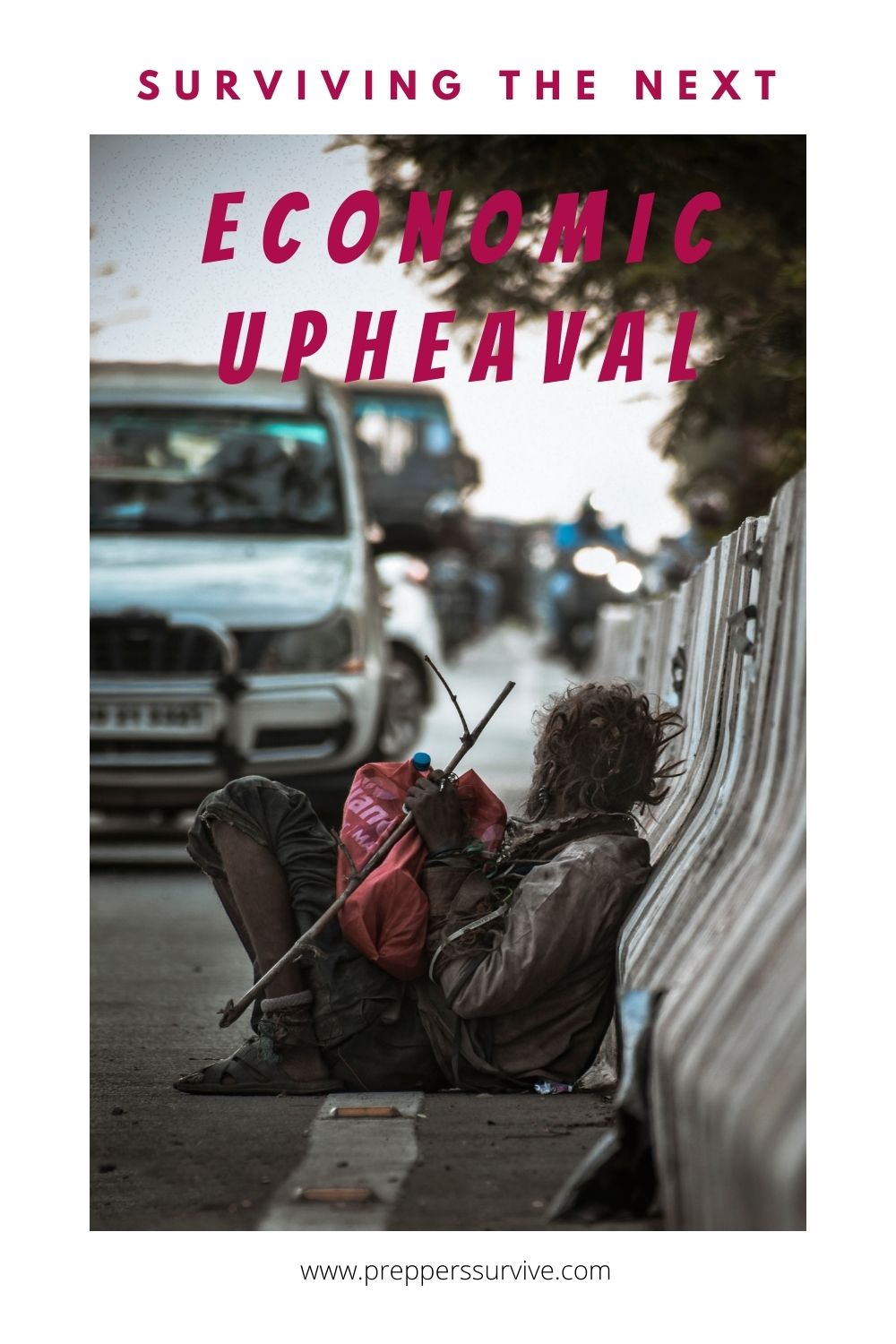Is surviving the next financial upheaval in the forefront of your thoughts? Is our society ripe to experience an economic downturn? Many avenues can cause an economic downturn, but it only takes one. Here’s a list of causes that historically have brought about a recession.
- stock prices become inflated and then take a sharp decline
- housing prices become inflated and then take a sharp decline
- consumers cut back on spending
- high-interest rates
- business struggle due to staffing problems
- manufacturing slow-downs
Does the list above seem possible within the next few years?
Surviving the Next Financial Upheaval by Preparing!

#1: Learn from others.
Study the past and learn from others who have endured hard times. Look back to yesterday’s pioneers or today’s homeless people. Consider the people of Argentina, Greece, or Venezuela, who have suffered economic collapse. We can also learn from the people of our own Great Depression. Between 1929 and 1933, stocks lost 90% of their value. Look into how our ancestors managed to survive the economic collapse in the past. Remember, History repeats itself!
#2: Store Basic Staple Foods with a Long Shelf Life
You can sustain your family during an economic challenge, whether it is hyperinflation, job loss, food shortages, or any other crisis, by storing months or years’ worth of basic staple foods.
Short-term shelf-stable foods that you use every day will minimize the impact of being unable to shop at the grocery store as usual. Despite the fact that these foods are shelf-stable, they will not store for 25-30 years like long-term food storage. Having both provides more options and will protect against hunger.
Cans, boxed mixes, packaged dinners, cold cereal, ketchup, and similar items are included in short-term food storage. Depending on the type of food, packaging, and storage conditions, these foods will remain good for 1-7 years.
It is incredibly wise to invest in food storage. Consider Venezuela’s hyperinflation, where product prices (on average) double every 19 days. If you were to purchase a case of six #10 cans of rolled oats for $24 today, that case would cost $144 in 4 months. Crazy, huh? More importantly, you would have a case of rolled oats to feed your family when food is scarce, or prices are outrageous.
#3: Basic Non-Food Staples
Make sure you have a supply of toilet paper, feminine products, shampoo, soaps, contact solutions, and other items that you use every day. Make sure also to have enough medication and first aid supplies.
Do you regularly take over-the-counter medications? Prepare a backup supply of over-the-counter pain relievers, allergy medications, cold and flu remedies, or whatever other medications you would like to stockpile for your family. It may also be a good idea to keep a supply of vitamin supplements on hand.
Minor injuries can be treated without medical assistance. Maintain a well-stocked first aid kit with all the supplies you may need. Prioritize your health. Eat healthily and exercise regularly. Make sure you get enough rest, fresh air, and sunshine.
#4: Grow Your Own Food
Even a small amount of food can be grown daily. You need years to build your soil and your skillset to the point where you can produce a reliable, abundant crop. Even if you can only grow a few potted tomatoes or herbs, it’s a good place to start.
Planting food-bearing trees, bushes, and vines right in your landscape is a simple way to produce reliable food. Edible plants can be stunningly beautiful in your yard—for example, an apple tree or bush cherry shrub. Goji berries are showy and can easily be incorporated into the landscape while fixing nitrogen into the soil to help other plants grow.
In addition to providing beauty and variety to the landscape, medicinal herbs such as lavender, chamomile, feverfew, hyssop, bee balm, and coneflowers also serve as herbal remedies.
#5: Raise Chickens
If you have the right setup, raising a few laying hens can provide needed fat and protein. For some good ideas on how to produce food in your own yard, take a look at this post preppers should have chickens. You’ll need to check with the laws that govern your area and review restrictions.
#6: Prepare to Provide for Yourself or Do Without
During an economic collapse, you should do everything possible to take care of your needs without relying on others. In addition to the resources you have stored, you may need to be creative and make do with what you can. Create a personal reference library of valuable books that you can turn in case search engines are unavailable.
#7: Prepare to Live with Little or No Electricity
During an economic downturn, you may need to lower your power bill. Reduce your energy consumption now by taking steps to prepare. Consider alternative energy sources (such as solar electric, solar thermal, propane, etc.) as part of your plan. Prepare yourself to live with little or no heat.
#8: Strengthen Your Financial Status
There is no way to completely protect your family against the effects of financial hardship, but there are ways to minimize their effects. One valuable lesson that will help you build your financial resilience is to learn to live without. You don’t need everything you think you do. Live on less and be happy.
#9: Live Within Your Means
In the 2008 housing market crash in the United States, many friends struggled, and some even lost their homes. Several of us know someone who lost a lucrative business and ended up penniless.
Some people were able to handle the challenges better than others because they had not overextended themselves prior to this crisis. Create a plan to get out of debt and keep your expenses low.
#10: Build up a Financial Reserve
Save money so you can protect yourself when financial crises occur. Have financial reserves of 6 – 12 months (or more, if possible) of expenses can buy you time to find a solution to whatever is causing financial stress—finding a new job, recovering from illness, paying off medical bills, unexpected car repairs, etc.
#11: Keep Cash Accessible
In most situations, cash is a powerful tool. Make sure you have cash readily accessible in the bank that you can withdraw at any time. Keeping some cash in small bills in your home is also a good idea.
#12: Invest in Precious Metals
As we have witnessed in Argentina and Venezuela, the dollar, or any type of paper money, is subject to rapid devaluation. Gold and silver, on the other hand, tend to retain value and may be a wise investment.
Precious metals may also serve as a means of bartering or an alternative currency. You might also want to check valuable items to store and trade in a collapsed economy. However, we strongly encourage you to invest in food storage before precious metals. Gold and silver don’t taste very good and won’t satisfy a hungry belly.
#13: Be Ready to Protect Your Family
Violence crime was cited as a reason Venezuelan citizens fled the country. Gun control laws prevent citizens from defending themselves with firearms. Alternative methods may be needed to protect and defend your family from dangerous people.
#14: Secure Your Home
Make your home less appealing to thieves by physically securing it. Secure all entry points to your home, plant thorny barriers (roses, thorny bushes) to deter intruders, build strong fences, store valuables out of sight, and install an alarm system if necessary. You can find vulnerabilities in your home by involving your entire family. It’s a great way for everyone to see your home in a new way and find areas that need strengthening.
#15: Maintain a Current Passport
If you decide to leave the country (as over 3 million Venezuelans have done), make sure you have the legal ability to do so. Maintain your passport and make sure you have the necessary plans in place to keep this option open.
Hope for the Best and Prepare for the Worst
It is important to have a positive attitude and deliberate preparation. The best we can do is take reasonable steps to prepare for future challenges and then enjoy today to the fullest. Worrying about surviving the next financial upheaval will not change the future, but prepping now can help mitigate it.
Thanks for visiting Preppers Survive. Before you leave subscribe to our newsletter. If you enjoyed this article, Surviving the Next Financial Upheaval, please share it on your favorite social media.

The post Surviving the Next Financial Upheaval appeared first on Preppers Survive.
By: PreppersSurvive
Title: Surviving the Next Financial Upheaval
Sourced From: www.prepperssurvive.com/surviving-the-next-financial-upheaval/
Published Date: Tue, 10 Aug 2021 04:13:11 +0000
-------------------------------------------------------------------------
Did you miss our previous article...
https://outdoorsnewswire.com/survivalist/5-reasons-to-take-an-online-survival-course
 CampingSurvivalistHuntingFishingExploringHikingPrivacy PolicyTerms And Conditions
CampingSurvivalistHuntingFishingExploringHikingPrivacy PolicyTerms And Conditions
